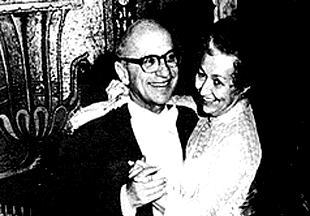Reading Rose Friedman on the Road to Serfdom
Rose Friedman passed away this week, following her last husband, Milton, of 68 years, into that blue beyond. Her ashes are to be scattered across the ocean, where the currents will carry her throughout the world – a fitting finish for a woman whose work has already graced so many shores. Like her more famous husband, Milton, her work lives on and reminds us that desperately need to heed the lessons they taught so well.
In many respects, it could be said that Claremont helped launch the Friedmans’ ideas into the mainstream. In 1958, Milton Friedman, along with F.A. Hayek and Bruno Leoni, gave a series of lectures at the Fifth Institute on Freedom and Competitive Enterprise at what is now Claremont McKenna. According to Professor Arthur Kemp, the lectures from this meeting were profoundly influential. Those lectures became Hayek’s The Constitution of Liberty, (which Professor Pitney recommends), Milton Friedman’s Capitalism and Freedom and Bruno Leoni’s Freedom and the Law. With Capitalism and Freedom, Friedman established himself as the intellectual advocate of economic and political freedom, with Rose, being very much behind and supportive of every thing he wrote. Where Milton went, so went Rose. In awarding Milton Friedman the Presidential Medal of Honor, President George W. Bush joked that the only person who had ever beat him in an argument was his wife.
 The
Friedmans’ influence on the national culture began at another time of
mass unemployment and American pessimism — during the late 1970s. In
1980, Rose and Milton co-wrote a book and a PBS series Free to Choose,
that became one of the most influential television shows of a
generation. The book sold some 400,000 copies that year alone and the
television program average 3 million viewers per episode. (You can
watch it all – legally – for free here.)
Unsurprisingly, for a school whose motto is that civilization prospers
with commerce, Claremont, too, got in on the act. In 1986, the Economics Department screened and discussed four episodes at the Ath. Since the publication of Free to Choose, the Friedmans visited the Ath twice
– in 1986 and 1996 – at Claremont. (Unfortunately, the Ath has lost the
videos.) They warmly mention Claremont McKenna in both of Two Lucky People and Free to Choose.
The
Friedmans’ influence on the national culture began at another time of
mass unemployment and American pessimism — during the late 1970s. In
1980, Rose and Milton co-wrote a book and a PBS series Free to Choose,
that became one of the most influential television shows of a
generation. The book sold some 400,000 copies that year alone and the
television program average 3 million viewers per episode. (You can
watch it all – legally – for free here.)
Unsurprisingly, for a school whose motto is that civilization prospers
with commerce, Claremont, too, got in on the act. In 1986, the Economics Department screened and discussed four episodes at the Ath. Since the publication of Free to Choose, the Friedmans visited the Ath twice
– in 1986 and 1996 – at Claremont. (Unfortunately, the Ath has lost the
videos.) They warmly mention Claremont McKenna in both of Two Lucky People and Free to Choose.
The Friedmans’ message of real hope – of maximizing human liberty in all things — resounded with a country struggling with the depths of economic malaise of the 1970s and rings true today in the midst of one of the worst economic recessions in recent decades. Together, the Friedmans imagined a different future for America and the world—a future we sorely need to work for under an Obama presidency where the only thing we seem free to choose is more government and less freedom. Such a vision of America would have struck the Friedmans as profoundly un-American (to borrow a phrase from our Speaker of the House).
But despite their passing, the Friedmans’ work should live on with the Milton and Rose D. Friedman Foundation, which has scored countless victories on behalf of liberty and more specifically school choice – an idea that was virtually unthinkable when they began their public advocacy. Indeed, a testament to their success can be seen in how much school choice’s opponents are willing to do to defeat it.
Just this past year, Obama suppressed a Department of Education study that showed vouchers boosted educational outcomes while saving money in D.C, one of America’s worst performing school districts. A young Obama, at least, was free to choose. He attended some of America’s best private schools and currently sends his daughters to one of the finest – and most expensive – D.C. public schools. (Watch this video to see just how tragic gutting that scholarship is for some of the lucky few to have been selected for it.)
It was just this kind of hypocrisy — that the liberal elite stifled freedom while enjoying their own — that the Friedmans fought against. They believed that America’s success stemmed from her constitution and culture of liberty – a liberty they sought to preserve and nourish. They dared to believe that people need private options, not public ones. And that is a message we need now more than ever. As the Friedmans write in their memoir, Two Lucky People:
Our central theme in public advocacy has been the promotion of human freedom….it underlies our opposition to rent control and general wage and price controls, our support for educational choice, privatizing radio and television channels, an all-volunteer army, limitation of government spending, legalization of drugs, privatizing Social Security, free trade, and the deregulation of industry and private life to the fullest extent possible.
We are all Lucky People for having had the Friedmans among us.








